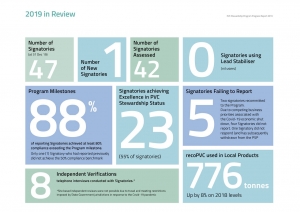vcaadmin
2019/20 PVC Stewardship Annual Report released
A new record 23 companies demonstrated full compliance with sustainability objectives applicable to their businesses in 2019 under the Australian PVC Stewardship Program, operated by the Vinyl Council of Australia.
Almost 9 out of 10 reporting signatories achieved at least Silver status (>80 % compliance), meaning the program exceeded it key performance benchmark, which is also a first in the program’s 18-year history. Key goals to improve use of sustainable additives and recycled PVC have also been exceeded.
The PVC industry’s life cycle approach to product stewardship has and continues to reshape the PVC, or vinyl, sector in Australia and the formulation of PVC products.
For the first time, over half the reporting signatory companies achieved Excellence in PVC Stewardship.
“The core purpose of the Vinyl Council of Australia is to enhance the industry’s opportunities for sustainable growth,” said Vinyl Council of Australia Chief Executive, Sophi MacMillan.
“To achieve this, the industry has adopted a strong and long-term focus on environmental sustainability which we deliver through a shared responsibility framework bringing together players across the vinyl supply chain, including importers and local manufacturers, as well as government and other key stakeholders.”
The Council’s PVC Stewardship Program is one of Australia’s longest running product stewardship initiatives. The voluntary program commits participants to strive for continuous improvement in environmental and health outcomes by meeting a series of challenging targets and standards related to the life cycle of PVC products, and 2019 marks another year of continued improvement across a range of outcomes.
Key among the highlights has been the avoidance of the use of lead stabilisers and pigments. These compounds had been used for decades as heat stabilisers for the processing of PVC or colourants. While regarded as safe in the finished product, the manufacture of the compounds and their handling in PVC extrusion posed health risks to workers.
This objective to phase them out was a key driver in establishing the PVC Stewardship Program (PSP) back in 2002 when the collective industry recognised and took responsibility for identifying safer alternatives and voluntarily phasing out the potentially harmful additive.
Whilst original signatories to the program ceased the use of lead stabilisers by the end of 2012, new companies signing up to the Program were found to be using them in specific, low volume applications where technically feasible alternatives had not yet been identified. As signatories to the Program, they have been required to report annually on the use and the progress in phasing them out. In 2019, no signatory reported any use of lead stabilisers or pigments.
“We are very pleased to see that the use of lead-based additives has been eliminated and this represents a key achievement of our program,” said Sophi MacMillan.
The full 2019 Annual Report for the PSP is now available on the Vinyl Council’s website and tracks the progress made by the industry over recent years. In total, 42 Signatories completed their annual assessment, which was down on 2018 in part due to the disruption caused by the Covid-19 pandemic.
The program benchmarks company performance. Two Signatories, APN Compounding and Polyflor Australia attained Excellence for the first time. Other big improvers were Altro APAC and Kenbrock Flooring. “We congratulate these companies as well as all those who achieved Excellence in PVC Stewardship for 2019/20” said Sophi.
A list of Signatories that achieved Excellence in 2019/20 can be found on the Vinyl Council’s website https://www.vinyl.org.au/signatories.
The issue of waste and resource recovery has dominated the political and sustainability agenda in the last two years and it remains a key issue for the community, and by extension the vinyl sector. To help drive markets for recyclate, the Program introduced a commitment four years ago that PVC product suppliers would bring products containing recycled PVC to the market. An increasing number of Signatories are fulfilling this commitment (two-thirds of eligible signatories in 2019) with increased volumes of recovered PVC being recycled into new applications and products.
“In 2019 we saw an 8% increase in use of locally produced PVC recyclate in locally made new products of our signatory companies, which means, over the past four years, these companies have diverted almost 2,500 tonnes of PVC into new use,” said Jan van de Graaff, who heads the Council’s national stewardship program.
“Our Program is dynamic, and we continually seek to raise the bar in terms of delivering triple bottom line outcomes. This was one of the reasons for introducing a Commitment governing modern slavery in 2019 and means we are one of very few Australian stewardship schemes that takes a broader view of sustainability.”
This Commitment is relevant to all our Signatories and requires them to identify and address the risk of modern slavery in the PVC supply chain. “We are pleased to see so many of our Signatories acting swiftly - more than 4 out of 5 signatories commenced this supply chain investigation in 2019.”
The full report can be found at https://www.vinyl.org.au/images/2019-PSP-FINAL-PUBLISHED-Annual-Report.pdf







